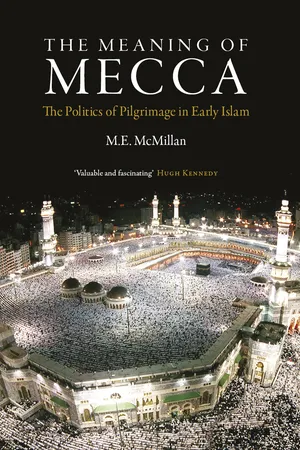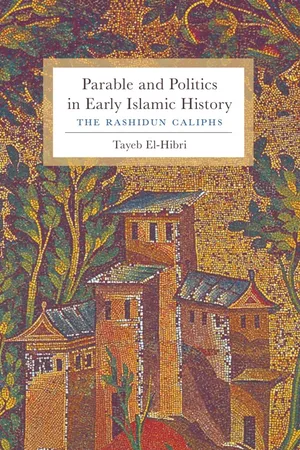History
Abu Bakr
Abu Bakr was a close companion and father-in-law of the Prophet Muhammad, and the first caliph (successor) of the Islamic community after Muhammad's death. He played a crucial role in unifying the Arabian Peninsula under Islam and expanding the Islamic state. Abu Bakr's leadership and contributions to early Islamic history are highly regarded, and he is considered a key figure in the development of the Islamic faith.
Written by Perlego with AI-assistance
Related key terms
3 Key excerpts on "Abu Bakr"
- eBook - ePub
The Meaning of Mecca
The Politi of Pilgrimage in Early Islam
- M E McMillan(Author)
- 2012(Publication Date)
- Saqi Books(Publisher)
ḥajj , however, allowed Abū Bakr to achieve the seemingly impossible goal of exercising a political authority that was firmly rooted in religion while not encroaching upon the sacred territory of Muḥammad’s prophecy.As well as the caliph, a number of men are cited by the sources as leading the ḥajj during Abū Bakr’s caliphate. All of them –‘Abd al-Raḥmān,46 ‘Attāb b. Asīd,47 ‘Umar b. al-Khaṭṭāb,48 and the caliph himself49 – hailed from the Prophet’s tribe of Quraysh and all but ‘Attāb were Companions of the Prophet and early converts to Islam. While ‘Attāb may have lacked the precedence of an early conversion,50 he could nevertheless claim a connection with the Prophet: Muḥammad made him governor of Mecca,51 an appointment Abū Bakr later confirmed.52 If ‘Attāb did lead the ḥajj in 11/633, his appointment may have owed much to practicality because, as governor of the Holy City, he was already in situ and could carry out the task with relative ease.As the sources cite a range of possible leaders for the ḥajj seasons of Abū Bakr’s caliphate, it is difficult to determine if these men were appointed to the task because of their personal merit; their relationship with the Prophet; their membership of the tribe of Quraysh; or a combination of all three.The Quraysh were certainly important to Abū Bakr – Madelung refers to his time in power as “the caliphate of Quraysh”53 – and this importance is evident in Abū Bakr’s military campaigns. He repeatedly appointed members of the pre-Islamic Meccan aristocracy (all Qurashī) to lead armies in the riddah campaigns and the early raids outside Arabia: members of two of the main clans in Quraysh, ‘Abd Shams and Makhzūm, led most of these armies.54 By contrast, only one of the early Muslims who sacrificed so much in the early days of the faith was given a prestigious military command during the riddah campaigns – Shuraḥbīl b. Ḥasanah – and not one of the Prophet’s early allies in Medina, the Anṣār , was given the chance to lead a Muslim army.55 - eBook - ePub
What is Shi'i Islam?
An Introduction
- Mohammad Ali Amir-Moezzi, Christian Jambet(Authors)
- 2018(Publication Date)
- Routledge(Publisher)
khalifa ) of the new community (the technical meaning of the title seems to have developed later), and thus his followers are the ancestors of those later designated as “Sunnis”.The followers of ‘Ali were on the opposing side. They maintained that Muhammad had clearly designated ‘Ali as his successor. He had done so, they argued, on several occasions in various ways, directly and indirectly. In their view it could hardly have been otherwise: how could the Prophet have left the important matter of his successor in abeyance? Could he have been so indifferent to the future leadership of his community as to leave it in uncertainty and confusion? This would be contrary to the very spirit of the Qur’an, in accord with which the successors of the great prophets of the past had been chosen from among the closest family members, who were privileged by blood ties as well as by initiation into the mysteries of their religion. True, the Qur’an does recommend seeking counsel in certain instances, but never in matters concerning the succession of prophets, which is fundamentally an issue of divine election. As far as his followers – those later called Shia – were concerned, ‘Ali was this chosen heir, designated by Muhammad and confirmed by the Qur’an. In this instance, ‘Ali’s youth – a dissuading handicap for the adherents of ancestral tribal customs – was not of any particular importance. We will return to this point later. ‘Ali is thus deemed by Shia to be their first imam (guide, leader, chieftain; like the term “caliph”, the technical meaning of the word imam came much later). The concept of imam referred to the true leader of the community, even if he did not effectively hold power. and as we shall see, the figure of the imam will become the central notion in the Shi’i religion, which never employs the term “caliph” to designate its leader.Thus Shi’ism is as old as the dispute over who should succeed the Prophet of Islam. Even so, it cannot be reduced to this alone. The Alid claim of legitimacy is just the starting point for monumental doctrinal developments in which the central issue of the “prophetic inheritance” acquires numerous complex meanings. These in turn shed light on important historical events. For this reason, though it may seem odd at first, we find it more apt and more illuminating to present the doctrinal issues in all their specificity before dealing with historical events. In the case of Shi’ism – and no doubt in all religious systems which base their legitimacy on ideas, practices and texts held to be sacred – doctrinal history goes hand in hand with general history, if indeed it does not shape that history to a large extent. When the essential aim is to reveal the true meaning of sacred things, when the mode of understanding and the mode of being impact on and co-determine one another, what is experienced becomes an essentially hermeneutic situation. Thus, the beliefs, the articles of faith and the very ideas will have as their fundamental mission the revealing of the true but hidden meaning of existence. Relying on historical and critical method, our aim is nothing less than to restore to historical events their inherent density, which often goes unrecognized. - eBook - ePub
Parable and Politics in Early Islamic History
The Rashidun Caliphs
- Tayeb El-Hibri(Author)
- 2010(Publication Date)
- Columbia University Press(Publisher)
ū Bakr in particular.The Issue of Leading the PrayerThe Sunnī view of history has long held that it was Muḥ ammad’s action of designating Abū Bakr to lead the prayer that provided a sign of the Prophet’s desire to see him succeed to the caliphate. This view, however, draws only on a partial reading of one version of the events that took place. Ṭ abarī ’s chronicle includes four versions of what the Prophet was going to do, as evidenced in the following reports.1. The first version declares that when the Prophet’s illness grew severe, he asked his companions, “Give me [pen and paper] so that I may write a document for you and you will never go astray after me [i’tū nī aktubu kitā ban lā taḍ illū ba‘dī abadan].”14 The companions wrangled over what he had said, as some started saying to others: “What is the matter with him? Is he starting to hallucinate [mā sha’nuhu, a-hajar]?” When they asked him to repeat, he gave up on them and reportedly muttered three wishes, which were, first, that they expel the polytheists from Arabia, and second that they give presents to the [Arab] delegations as he used to; the narrator claims to have forgotten the third! (This is taken by some as an omission of the order to have ‘Alī succeed him.)This version already evokes for the reader the range of meanings to which such accounts are open. When we see the companions suspecting infirmity in the Prophet, it is not clear if this is because he was simply asking to write (when he is traditionally viewed as illiterate), or whether he was trying to add to the Qur’ā n (which Muslims were urged to consider already complete), or whether he just wished to name a successor (which could not have been allowed to be revealed in so straightforward a manner).15 It is also worth noting that in this version Ṭ abarī sets the dialogue between the Prophet and the collectivity of the community, thus making them question together the Prophet’s desire to put something in writing. The word used to reflect their challenge, “qā lū ” (they said), can quickly slide by as being part of the normal course of narration, when in fact it greatly reflects Ṭ abarī ’s choice to tone down the responsibility for this questioning. If an error was being committed in this exercise, then Ṭ abarī was clearly trying to make it seem somewhat forgivable by virtue of the fact that it was the whole group that got the wrong impression (if indeed it was a “wrong” action). In texts other than those given by Ṭ abarī
Learn about this page
Index pages curate the most relevant extracts from our library of academic textbooks. They’ve been created using an in-house natural language model (NLM), each adding context and meaning to key research topics.


